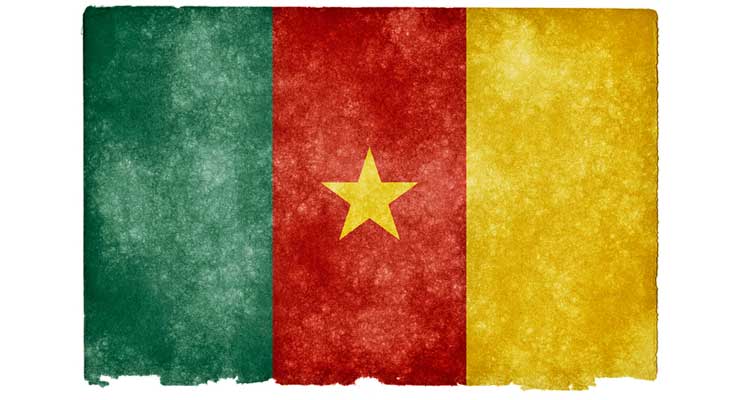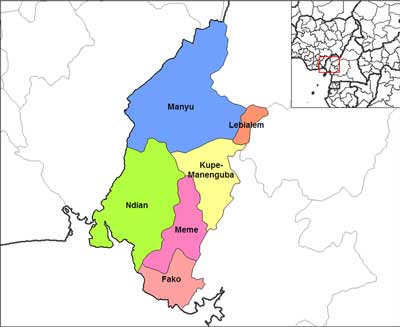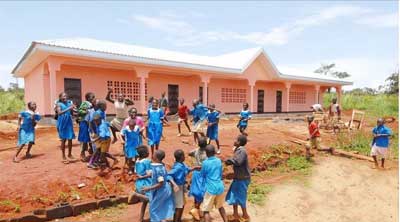This is part three of a series on Cameroon’s current crisis:

December 2016-February 2017: the crisis continues
Since 08 December 2016 the situation has aggravated. The Cameroon Anglophone Civil Society Consortium, (CACSC), an umbrella organisation for the teachers, lawyers, traders, taxi drivers, motor-cycle riders (okada), has constituted a united front to fight what they have perceive is Government’s deceit, intimidation and brutality. The ad hoc committee meetings held on the 27 December 2016 in Bamenda for the teachers and in Yaounde for the Lawyers[i] failed largely because of this united front.
The CACSC constituted a platform where the lawyers and teachers could adopted a common front to bring Government to respond favourably to their demands. The meetings of 27 December 2016 failed as both lawyers and teachers asked for the release of all Anglophone youths kidnapped from their home towns notably from Bamenda and Kumba and taken to Yaounde in an unlawful manner.

They asked for the inclusion of all their colleagues of the NW and SW Regions as they had quickly perceived Government’s divide and rule tactics. The meetings ended with a walk out of laywers in Yaounde and of teachers in Bamenda. The amount of influence that the CACSC has exerted over the Anglophone community is unprecedented.
After the President’s traditional 31 December speech, Anglophone Government pundits made lots of efforts to call Anglophone parents to send their children to school on 09 January 2017 without the Government having resolved the issues raised by the lawyers and teachers. There was a lot of bribery and corruption going on with huge sums of money doled out to traditional rulers and other educational stakeholders.
The Minister of Secondary Education also carried out working visits in several towns in the NW to ask teachers to return to school. In response, the CACSC through press release No 12 of 04 January 2016 asked the entire West Cameroon community to observe a ghost town. The response was without precedence. From Victoria on the Atlantic coast to Nwa in the North of the BSC territory, the ghost town was scrupulously observed on 09 January 2017. In response, the Government acted as if she had taken the issue seriously as she released some of the children who were kidnapped as mentioned above and decided to return to the negotiation table on the 12-13 January 2016.
The easy way out: Government sinks into fascist repression, matters complicate as Anglophones hold steadfast to the protest making nonsense of Government manoeuvres
What many had predicted finally happened in the week of 15-21 January 2017. The week before, the teachers’ ad hoc committee held another two working sessions on 12 and 13 January 2017. These working sessions each ended late into the night. In the early hours of 14 January 2017, just past midnight, there were violent clashes between police forces and citizens in Bamenda leading to civilian injuries with four civilians seriously wounded.[ii]
These clashes occurred because of the apprehension by the populace that the Trade Union leaders were about to give in to the Government without anything in return. As a result, the CACSC decided to call-off the Press Conference scheduled for 11:00 a.m that Saturday 14 January 2017. Instead of this Press Conference whose purpose was to explain the decisions of the ad hoc committee and seek popular approbation before calling off the strike, the CACSC decided, through a Press Briefing on 14 January 2017 to call another ghost town, this time for two days, for the 16 and 17 of January 2017.[iii]
The reason was to protest the brutality and obstinate use of force by Government forces registered in those early hours of 14 January 2017. In this Press Briefing the CACSC also called for a referendum for the people of West Cameroon to decide their future. The two-day “ghost town season 2” was again effective. On Monday 16 January 2017 the President of the ad hoc committee for the teachers decided to terminate its missions, saying that it was now left for the hierarchy to take “appropriate action”.[iv]
This “appropriate action” did come on the second day of the ghost town season 2, i.e. on 17 January 2017. On that day the Minister of Territorial Administration and Decentralisation (MINATD) signed a Ministerial Order banning the CACSC and the SCNC and “all other groups with similar agenda”. Then without declaring any state of emergency the Government instituted a de facto one as she ordered telephone companies to cut off internet connectivity from the NW and SW.[v]

In the night of the 17-18 January 2017, The President of the CACSC and its Secretary General were both kidnapped by police officers from Buea and taken to Yaounde. The Programs Officer of the CACSC reportedly took refuge in a Western Embassy that same night[vi] while other members of the CACSC have since escaped the country. Mancho Bibixy was kidnapped in Bamenda on 19 January 2017 and taken to Yaounde too.[vii]
The next day an Anglophone Chief Justice at the Supreme Court who had at one point been openly sympathetic with the SCNC became the next target for illegal arrest. He was finally arrested in the most deceitful and unlawful of manner on 21 January 2017 in Yaounde.[viii] Since then, the Government has embarked on intimidating the population through text messages that warned of long jail terms and heavy fines for sharing “false information” and for making any “slanderous statements” and “false declarations” on social media.
Government has done so through her Ministry of Posts and Telecommunications (MINPOSTEL). MINPOSTEL practically harassed telephone “subscribers” for close to a month with multiple SMSs on these “crimes”. While these text messages made no references to the relevant legal texts, these laws do exist, notably the Penal Code Section 240, Law No.2014/028 of 23 December 2014 on the Suppression of Acts of Terrorism and Law No.2010/012 of 21 December 2010 relating to Cybersecurity and Cybercriminality.[ix]
Whatever the case, any law that is at odds with the human rights of freedom of speech and expression is an unjust law. St. Augustine the Theologian and Philosopher stated clearly that “Lex iniqua lex non est” i.e. “an unjust law is no law”. All these laws cited above are unjust especially in the light of international conventions that protect both offline and online expression and speech. LRC simply has a taste for gaging citizens.
The National Communication Council (NCC) has also muzzled the press and has censored the press, ordering that no TV or Radio Channel should talk about the Anglophone problem again nor organise debates on federalism, else be stricken with closure or seizure of credentials. Many Anglophones have been arrested since then in the most arbitrary of ways and many are reported dead, killed summarily by the police.
In the meantime, just before his arrest on 17 January 2017, the President of the CACSC transferred operations to leaders in Europe and USA and prescribed that ghost towns be respected every Mondays to Wednesdays until 23 February 2017. These new leaders of the CACSC later reduced these ghost town days to Mondays and Tuesdays. Since then, seasons 3 and 4 of the ghost town have been respected. Schools have also not resumed since the start of the second term.
The Government has clearly refused dialogue and has continued to intimidate Anglophones. In the SW, the State authorities have embarked on closing down shops of individuals who respect the ghost towns while a some CPDM Mayors have embezzled council funds to buy taxis “to beat the ghost town”;[x] both acts (closing shops and buying taxis) are ultra vires. Also, soldiers and policemen who do nothing but inspire images of rape and torture in the minds of Anglophones have been allowed to continue plying the streets in the name of providing security. The Government of LRC has ignored the fact that it is the people of BSC who have adopted the struggle as parents have clearly refused to send their children to school. Government seems to have adopted an irresponsible and reckless strategy/bet of expecting that when people will get tired of staying at home they will get back to school and courts.
Despite the fact of the declaration of a blank year being the prerogative of the State, if Government does not extend the school year, no certificate obtained from Cameroon in 2016/2017 will be recognised in the rest of the world, seen the number of hours of schooling that have been lost that surpass the total set by UNESCO for voiding an academic year.[xi] Seen the modus operandi of the regime, it can be expected that if this is finally the case, the Government will in all irresponsibility shift blame to the Anglophone community and probably instigate an atmosphere of animosity between Francophones and Anglophones.
Despite a meeting held in Kumba in the SW by the Common Law lawyers,[xii] partly to agree on a common stance for future deliberations with Government, repression has led to a situation where the lawyers’ ad hoc committee has ended prematurely and some lawyers are on the run. Whatever the case, the deadlock remains and no one knows what would happen next, since Government has jailed the main interlocutors and caused many to go on self-exile. What is certain is that the ghost towns are being observed.
Many have said that if the 11 February day plebiscite day, re-baptised by Ahidjo as “Youth Day”,[xiii] does not hold effectively in the NW and SW such a situation might be a game changer favourable to BSC. This seems to be part of the strategy of the consortium in calling for the ghost towns. To attempt to beat this strategy, the Government has manoeuvred her way into some of the trade unions that called for a suspension of the strike on 03 February 2017 in the most irregular of ways. However, despite this move, schools have still not resumed.
Anglophones waited to see who will win the 11 February fight; they who have total authority over their children or the Government that just cannot stop acting in fascist irrationality. One of such acts of irrationality is the creation of another belly politics commission termed National Commission of Bilingualism and Multiculturalism in Cameroon, (NCFPBM) on 23 January 2017. All this while, and in the past decades, Anglophones have been calling attention to need to respect the principal material and immaterial aspects of the nature of the two national communities that are forced to live together in Cameroon today, namely bilingualism, dual education system and the bi-jural system but Biya instead favours talking about multi-ethnicity through the idea of “multi-culturalism, something that is not relevant to the 1961 stifled pacts.
Some have said that even more irrational and draconian measures will be taken in the days after 11 February 2017 as if to say that the Biya establishment is simply just blind to the fact that Anglophones want to demonstrate that they have control over their own destiny. The fascist tendencies of the Biya regime in this crisis are completely at odds with Biya’s claims that he has made “Cameroon an advanced democracy”.
The 11 February 2017 day did come and the boycott was total. After more deadly confrontations in Ndop in the NW Region and in other towns like in Akwaya and Kumba in the SW Region on 09-10 February 2017, the Youth day of Ahidjo was boycotted for the first time in Anglophone Cameroon as a sign of disapproval of the denial of BSC history by the successive francophone-led regimes. This could only be the case as Biya had made more provocative statements in his speech to the youths on 10 February 2017. He claimed the Government will continue dialogue and at the same time refused all dialogue that for Federalism. He equally kept silent on the internet shut-down and instead said his regime will continue the arrest and prosecution of any “extremists”.
The boycott of the 11 February 2017 day has led the CACSC to take one step further in the protests. The CACSC has stated that Government has refused dialogue on Federalism and therefore separation was the only option left for the people of the BSC. Through its communication of 12 February 2017, the CACSC has now called for civil disobedience and the boycott of police/courts as the first step towards separation. This is clearly what the vast majority had predicted as the logical outcome of Government’s wrong approach to dialogue and the regime’s inherited and innate denial of discussions on Federalism.
[i] K’mer Saga, “Cameroon – Anglophone Problem: Convening of two Anglophone lawyers in Yaounde for the first meeting of the Ad Hoc Committee to examine and propose solutions to Anglophone claims”, consulted on 31 January 2017 from https://goo.gl/RH2xUb
[ii] All Africa, “Cameroon: Anglophone activists call for month of ‘ghost towns’ moments before arrests and internet shutdown”, consulted on 30 January 2017 from https://goo.gl/icoicc
[iii] Henriette Lounge, “Consortium declares Monday and Tuesday Ghost Town in the entire West Cameroon”, consulted on 29 January 2017 from https://goo.gl/ZVEd0d.
[iv] Cameroon Concord News, “Ghogomu Paul Mingo announces end of Ad Hoc Committee missions, attacks consortium”, consulted on 30 January 2017 from https://goo.gl/1t3yIH
[v] K’mer Saga, “Cameroon – Anglophone problem: Government bans activities of SCNC and Consortium”, consulted on 30 January 2017 from https://goo.gl/a8ktnO; All Africa, “Cameroon: Anglophone activists call for month of ‘ghost towns’ moments before arrests and internet shutdown”, consulted on 30 January 2017 from https://goo.gl/icoicc
[vi] All Africa, “Cameroon: Anglophone activists call for month of ‘ghost towns’ moments before arrests and internet shutdown”, consulted on 30 January 2017 from https://goo.gl/icoicc
[vii] Daily News Cameroon “Breaking news!!!: Mancho Bibixy arrested in Bamenda Northwest Cameroon”, consulted on 30 January 2017 from https://goo.gl/teBXEq
[viii] Cameroon Concord, “Breaking news Cameroon: Security Forces Arrest Ayah Paul”, consulted on 30 January 2017 from https://goo.gl/F0VICw
[ix] MINPOSTEL, “Declaration by the Minister of Posts and Telecommunications within the framework of the awareness campaign for a responsible use of social media in Cameroon”, published 16 January 2017, consulted on 30 January 2017 from https://goo.gl/K45rzo
[x] Cameroon Info, “Cameroon – Anglophone Crisis: Buea Council Mayor Challenges Ghost Town, Purchases New Taxis” consulted on 30 January 2017 from https://goo.gl/LXzXrV
[xi] Bareta Press, “Certificates from the Cameroons shall not be recognised”, consulted on 30 January 2017 from https://goo.gl/y2wXpa
[xii] LccL Info, “Cameroon – Anglophone Problem: Common Law Lawyers Meet in Kumba, Set Committee To Draft Federal Constitution”, consulted on 31 January 2017 from https://goo.gl/pdcvZF
[xiii] Kini Nsom in All Africa “Cameroon: Youth Day is Distortion of Historical Facts – Historian”, consulted on 31 January 2017 from https://goo.gl/vEnw1k
Leave a Reply